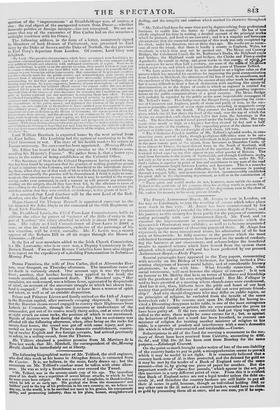The following biographical notice of Mr. Telford, the civil engineer,
who died this week at his house in Abingdon Street, is extracted from the Courier. It is, we believe, in the main, fairly drawn up ; but the encomium on Mr. Telford's candour must be taken with some allow- ance. He was as wily a Scotchman as ever crossed the Tweed.
"Mr. Telford, was in the seventy-ninth rear of his age. The immediate cause of his death was a repetition of severe bilious attacks, to which he had for some years been subject. He was a native of Langholm, in Dumfriesshire: which he left at an early age. His gradual rise from the stonemasons' and builders' yard to the top of his profession in his own country, or, we believe we may say, in the world, is to be ascribed not more to his genius, his consummate ability, and persevering industry, than to his plain, honest, straightforward
dealing, and the integrity and candour which marked his character throughout life.
" Mr.Telford had been for some time past by degrees retiring from professional business, to enable him the better to adjust his mantle.' Hellas of late chiefly employed his time in writing a detailed account of the principal works which he planned, and lived to see executed ; and it is a singular and fortunst circumstance that the corrected manuscript of this work was only completed by his clerk, under his direction, two or three days ago. His works are so nume- rous all over the island, that there is hardly a county in England, Wales, oe Scotland, in which they may not be pointed out. The Menai and Conway, Bridges, the Caledonian Canal, the St. ICatharine's Docks, the Holyhead roads and bridges, the Highland roads and bridges, the Chirke and Pont-y-cisilte Aqueducts, the canals in Salop, and great works in that counv, , of wjtiik4et was surveyor for mote than half a century, are some of the trEts of litsgemos which occur to us, and which will immortalize the name of Thomas Telford. " We bare access to know that he was inclined to set a higher value on the success which has attended his exertions for improving thereat communications from London to Holyhead, the alterations of the line of road, its smoothness, and the excellence of the bridges, than on the success of any other work he executed: but it seems difficult to draw a line of distinction with anything like nicety of discrimination, as to the degree of credit to which an engineer is entitled foe ingenuity to plan, and the ability to execute, magnificent anc puzzling improve- • merits on the public communications of a great country. The Menai Bridge will probably be regarded by the public as the most imperishable monnymot.of Mr. Telford's fame. This bridge over the Bangor Ferry, connecting the coun- ties of Carnarvon and Anglesca, partly of stone and partly of iron, on the sus- pension principle, consists of seven stone arches, exceeding in magnitude every work of- the kind in the world. They connect the land with the two main piers, which rise 53 feet above the level of the road, over the top of which the chaiva are suspended, each chain being 1,714 feet from the fastenings in the rock. The first three-masted vessel passed under the bridge in 1826. Her top- masts were nearly as high as a frigate ; but they cleared 12 feet and a half below- the centre of the roadway. The suspending power of the chains was cal-. cu!ated at :LIM; tons ; the total weight of each chain, I:21 tons. " The Caledonian Canal is another of Mr. Telford's splendid works, in con- structing every part of which, though prodigious difficulties were to be sin-. mounted, he was successful. But the individuals in high station now travelling in the most remote part of tlie island, from Inverness to Dunrobin Castle, or frein thence to 'Those. the most distant town in the North of Scotland, will there, it we are not mistaken, find proofs of the exertion of Mr. Telford's pros. lessional talent equal to any that appear in any other quarter of Britain. The road from Inverness to the county of Sutherland, and through Caithness, made, not ouly so far as respects its construction, lint its direction, under Mr. rci- ford's orders, is superior in point of line and smoothness to any part of the road of equal continuous length between London and Inverness. This is a remark- able fact, which, from the great difficulties he had to overcome in passing through a rugged, hilly, and mountainous district, incontrovertibly establishes his great skill in the engineering department, as well as in the construction of peat public communications. -e " These great and useful works do not, however, more entitle the name of Telford to the gratitude of his country, than his sterling worth in private life. His easiness of access, and the playfulness of dais disposition, even to the close of life, endear his memory to his many private friends.'
















 Previous page
Previous page